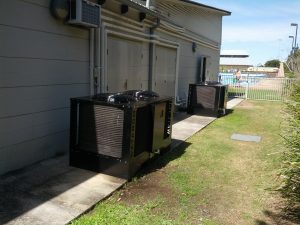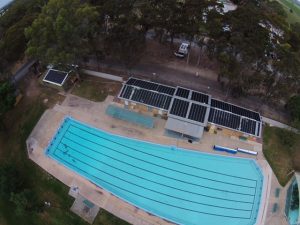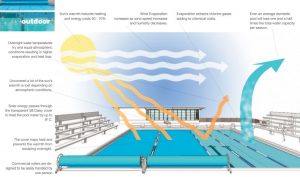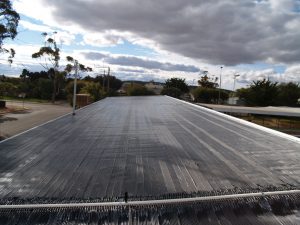Public swimming pools are a common sight across Australia and have provided an essential community service attracting people from all walks of life. For many Aussies, the local pool is where we learnt to swim as kids, where we hung out with our teenage friends after school, and where we swam laps to stay fit and catch up with our fellow retirees.
With natural gas prices continuing to soar, councils are under increasing pressure to account for the operating costs of municipal pools, especially when it comes to heating systems.
Maintaining the ideal temperature for large pools is costly, with evaporation accounting for approximately 70 per cent of heat loss from both indoor and outdoor pools. Consequently, operators of council-owned pools and aquatic parks are looking for ways to decrease their energy bills. To achieve this, many are investing in energy efficient pool heating solutions to supplement or replace the commonly installed gas fuelled systems.
When deciding on which solution to recommend to commercial customers, you may wish to consider the following options:
Pool covers
There are several ways to keep warmth in a swimming pool fitted with an existing heating system. The most effective in preventing heat loss and reducing energy consumption is to install a pool cover.
Pool or solar covers act as a blanket over the water, trapping warmth and helping save on heating costs. Less evaporation also means less money spent on water and chemical bills. Pool covers also reduce the effort and expense required to maintain the pool by preventing leaves and debris from polluting the water, subsequently keeping it cleaner for longer.
Solar pool heating
The most environmentally friendly option of all pool heating systems, solar pool heating seizes the sun’s natural energy via a series of tubes (known as the collector), which ideally is located on a north facing roof. Solar systems are a low-cost method to heat large pools in the warmer months and have small operating costs – just the cost of electricity to pump the pool water through the solar absorber on the roof.
The amount of heat absorbed and the subsequent increase in temperature depends on three key criteria: the size or area for the collector and the number of tubes per square metre; the location of the collector; and the quality of the control system.
Pool heat pumps
 Reliable, highly efficient, and economical to run – heat pumps work similarly to reverse cycle air conditioners in that they extract latent heat from the air and use it to produce warm pool water.
Reliable, highly efficient, and economical to run – heat pumps work similarly to reverse cycle air conditioners in that they extract latent heat from the air and use it to produce warm pool water.
Compared to gas and electric systems, heat pumps use just a fraction of the energy to generate the same amount of heat output. Although heat pumps initially take longer than gas heaters to warm up the pool water, once they do get to the desired temperature they are much more economical to run and, when sized appropriately, will maintain the warmth just as well as gas heaters.
Pool heat pumps may be expensive to install initially, but the low operating costs make up for this compared to other forms of conventional pool heating systems. It really is a good alternative if you want to extend the swimming season or there is not enough roof space for solar.
Remember, solar heating can be used in conjunction with heat pumps and gas heaters to provide year-round swimming. The solar system will be used to heat the pool whenever free energy is available. When the sun has set or clouds obscure sunlight during the colder winter months, the secondary form of heating will take over.
Olympic sized pools, hotels, water parks, resorts, universities and schools – Zane Solar systems have been installed all over Australia and overseas in a wide range of applications. In fact, it’s our expertise in this area, coupled by decades of experience which has enabled us to successfully compete beyond the reach of most other companies in the solar sector.
Zane Solar supplies energy efficient, cost-effective heating solutions keeping commercial pool operators and their customers happy and comfortable year-round.
For more information, call us on 1300 009 263.




